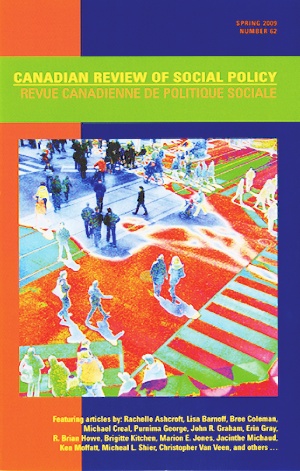Factors Affecting the Impact of Child Advocacy Offices in Canada
Abstract
International interest in children's rights and in official child dvocacy agencies responsible for pomoting the rights and voices of children is increasing. This article examines the conventional wisdom on factors that enhance the impact of these agencies. It does so through a stucly on the impact of provincial child dvocacy offices in Canada. In line with conventional wisdom, the findings show that, in general, a higher level of impact is associated with offices that are independent from government, exclusively focused on children, accessible to children, and that have a wide marulute, strong statutory powers, and a broad advocacy function. But what also is suggested in the findings is the importance of a factor not given attention in the conventional wisdom - slcillful ledership in the context of a receptive political culture. In conjzinction with or in the absence of othe~ facilitating factors, leadership in a supportive political environment can play a significant role in acluancing the rights of children. On assiste dans le monde entier h un regain d'inte'rzt pour les h i t s des enfants et les organismes de &fense de l'enfance qui sont responsables de la promotion des droits et de la voix des enfants. Duns cet article, on examine les ide'es resues sur les facteurs qui rehaussent l'influence de ces organismes et, notamment, par une e'tucle sur l'influence des organismes provinciaux de de'fense de l'enfance au C a d . A l'instar des ide'es repes, l'e'tude conclut qu'un niveau plus ileue' d'injluence est observe' dans les organismes qui sont indipendants des pouvoirs publics, exclusivement axes sur les enfants, accessibles aux enfants, et cew qui ont un waste mandat, lles robustes pouwoirs statutuires et une ample fonction de repr6sentation. Cependant, les re'sultuts montrent aussi l'importunce d'un facteur qui n'a pas suscite' lJmt6rZt des wues traditionnelles : le leadership awist! dans le contexte d'une culture politique re'ceptiwe. Une lles conclusions tire'es weut qw conjointernent awec, ou en l'absence, d'autres fucteurs facilitateurs, le ledership peut jouer un r8le iml~ortandt ans la promotion des droits lles enfants.Downloads
Published
How to Cite
Issue
Section
License
1-The author guarantees that the manuscript is an original work not published elsewhere in print or electronically in whole or in part, except in abstract form, that the author has the full power to make this contribution, and that the manuscript contains no matter libelous or otherwise unlawful or which invades the right of privacy or which infringes any proprietary right.
2-The author guarantees that the manuscript has not been previously published in print or electronically and that if the manuscript contains any tables, figures or images fully reproduced or closely adapted from previously published material, the author must obtain the necessary permission from the author/publisher holding the original copyright prior to publication in CRSP. The author may be required to produce evidence of permission granted to CRSP’s editors.
3-As a condition of publication in CRSP, the author assigns all copyright to CRSP, including but not limited to the right to publish, republish, and otherwise distribute this manuscript in print, electronic, or other formats. As CRSP is a non-profit interdisciplinary scholarly journal, the author will receive no royalty or other monetary compensation for the assignment set forth in this agreement.
For the purpose of full disclosure, CRSP will not normally use the content provided by the author in a commercial venture, but for the purpose of disseminating the author’s content to as many readers as possible. For distribution, third parties engaging in commercial activities may be contracted to distribute the content globally, and such parties may make a profit out of the author’s content in their normal course of business. CRSP will not pay the author or reimburse the author in any form based on such commercial activities because the conduct of such commercial activities is outside the control of CRSP.
Any future reference to or use of this published material by the authors must acknowledge CRSP as the original place of publication.
PERMISSION REQUEST/ARCHIVING
Permission is given to author(s) receiving funding via Tri-Council Agencies, the Canadian Institutes of Health Research (CIHR), the Natural Sciences and Engineering Research Council of Canada (NSERC) and the Social Sciences and Humanities Research Council (SSHRC), to make their publications freely available in an Open Access repository within the stated deadline by the Tri-Council Agencies (12 months following publication). Archiving of publication must be a manuscript copy bearing none of the CRSP headers, footers or any other distinguishing marks. No links to the article on the CRSP website is permitted.
Permission requests from third parties to reproduce articles in part or full in academic/educational publications can be directed to the managing editor of CRSP, and will not be unreasonably denied.

